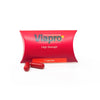Stress and anxiety are more common than we think with recent studies found that about a third of UK workers were stressed nearly all of the time. Stress and anxiety can have an impact not only on your mental health but your physical health too.
What’s the difference between stress + anxiety?
But first, let’s look into the difference between stress and anxiety. Both are emotional responses however stress is typically caused by an external trigger such as a work deadline, lifestyle pressures, loss of a job or chronic illnesses.
Most people under stress experience mental and physical symptoms such as irritability, mood swings, anger, fatigue, muscle pain, digestive problems and difficulty sleeping.
Anxiety is more of persistent, excessive worrying that doesn’t go away – even in the absence of a stressor. Anxiety can lead to almost the same symptoms including difficulty concentrating, fatigue, muscle tension, irritability and insomnia.
Fortunately, both mild stress and anxiety respond well to coping mechanisms whether it be physical activity, a healthy balanced diet or good sleeping patterns. Here are 10 simple ways to help relieve stress and anxiety:
1. Exercise
Exercise is one of the most important things you can do to combat stress. It helps to release endorphins, which are chemicals that improve your mood. It can also help lower the body’s stress hormones, such as cortisol. Exercise can also help improve your sleep and boost your confidence.
Try implementing walking, jogging or yoga into your day.
2. Supplements
Several supplements help to eliminate stress and anxiety including green tea, ashwagandha, valerian and omega-3 fatty acids.
3. Reduce your caffeine intake
Caffeine can be found in coffee, tea, chocolate, energy drinks and some sodas. High doses can increase anxiety and although people have different caffeine tolerances, it can cause jitters and anxiety. In moderation, caffeine can be healthy and is even used to help with erection problems.
4. Say no
One of the biggest reasons we can put ourselves under so much stress is due to not saying no. This can be helpful if you find yourself taking on too much and juggling many responsibilities. Saying no to things can help reduce your stress levels and anxiety.
5. Turn up the music
Listening to music can have a very relaxing effect on the body and is great for lowering blood pressure and stress hormones. It is also known for putting us in a better mood and can also help motivate us through the day.
6. Deep breathing
Deep breathing is a great way of relaxing the body and calming your mental state. Deep breathing helps to control the relaxation response. The goal is to focus on your awareness of your breath, making it slower and deeper. This helps to slow your heart rate, allowing you to feel more relaxed.
7. Meditation
Meditation helps you to produce a deep state of relaxation and allows your attention to focus on eliminating the many thoughts that may be clouding your mind and causing stress.
8. Connect with others
It’s great to meet up with family, friends and colleagues. Talking things through with a friend may help you see things differently and also may help you find solutions.
9. Have some ‘me time’
Having some ‘me time’ can be anything from going for a walk and exploring somewhere new to socialising with friends or exercising. Having time earmarked out of your day means you’re able to prioritise ‘me time’ and not be tempted to work overtime.
10. Write it down
Writing it down whether it be a jumbled thought list, a to-do list or even maybe how you’re feeling helps to organise your thoughts and clear your mind. It’s also great for recognising a pattern and what triggers your stress and anxiety the most.
Note: This information presented is not intended to help treat, diagnose or substitute for professional medical advice. We always recommend speaking with your doctor for more information.






